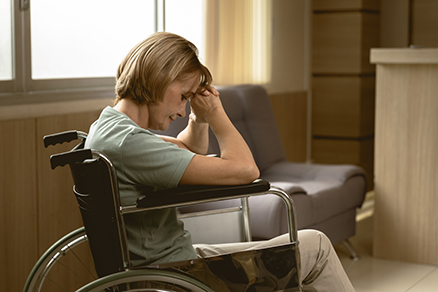Most people have heard of the term “concussion,” especially when it comes to kids or athletes who get bumped on the head during sports or play. A mild concussions would be classified as a type of a mild brain injury. Typically, they come with symptoms like headaches, dizziness, confusion, nausea, or even double vision. While these might seem minor at first, repeated concussions, even when categorized as mild, can lead to more serious problems over time.
 A one-time catastrophic injury is much different and is referred to as a traumatic brain injury (TBI). It is defined by the Centers for Disease Control (CDC) defined as “a disruption in the normal function of the brain that can be caused by a bump, blow, or jolt to the head, or a penetrating head injury.”
A one-time catastrophic injury is much different and is referred to as a traumatic brain injury (TBI). It is defined by the Centers for Disease Control (CDC) defined as “a disruption in the normal function of the brain that can be caused by a bump, blow, or jolt to the head, or a penetrating head injury.”
While most people recover fully from a mild brain injury or concussion within weeks or even days, victims of TBIs may experience persistent symptoms that last months or years, or impact their life forever. The effects of TBIs may be physical, cognitive, and emotional.
In terms of costs, from emergency room visits to X-rays and MRIs and CT scans, not to mention time off work, surgeries and other procedures, and long-term rehabilitation, the potential for a personal injury claim is evident if the TBI is someone else’s fault.
Learn more about our Sacramento Brain Injury Attorney Services.
For over thirty years, we have helped victims of traumatic brain injuries. We offer a free consultation to answer questions and clarify the facts surrounding the potential for a personal injury claim. Call our office today at (916) 438-1819 to schedule.
What to Know About the Long-Term Effects of Traumatic Brain Injuries
Not everyone experiences brain injuries, mild or traumatic, the same way. One person may have dizziness but not headaches; another person may experience nausea only. However, anyone who suffers a head injury of any type should get checked out by a medical professional as soon as possible.
Here are just some of the long-term consequences of TBIs:
Physical
- Lingering headaches or headaches that do not respond to over-the-counter medication
- Dizziness or balance problems
- Over-sensitivity to light or sound
- Fatigue that falls outside of “normal” for the victim compared to pre-injury energy levels.
Thinking or Cognition
- Challenges with memory or attention
- Problems with learning, understanding, or processing information
- Delay in reaction times or lack of responsiveness
Emotional and Mental
- Anxiety and/or depression
- Irritability or impatience
- Mood swings
- Violent or disruptive behavior
Again, not all people who have suffered a traumatic brain injury will suffer from all of the after-effects listed above, and some symptoms may come and go or not present themselves all at once. Family members, close friends, and work associates should speak up if they notice the injured person exhibiting these behaviors or if the person behaves differently than before the accident.
How Traumatic Brain Injuries Lead to Personal Injury Claims
Personal injury claims and lawsuits start with a duty of care, defined as the legal obligation to act in a way that does not harm others. In terms of personal injury law, if someone has a duty of care, that is, a responsibility to keep another party safe and free from harm, and they fail in that duty of care, laws are in place that protect the injured party and hold the responsible party accountable for damages.
A simple example is a driver’s duty of care to follow the rules of the road so that other drivers on the road stay safe. Breaching that duty of care points to negligence when a personal injury claim becomes the only fair option. Another example is a store that fails to clean up a spilled liquid, resulting in a customer falling and getting injured. These are two common scenarios from which personal injury claims often arise.
Hypothetical Case Study: Fallout for an Injured Chef
Maria Espinosa, owner of Elegant E’s Catering, suffered a serious concussion after being struck by a falling board from scaffolding as she walked to work in a busy downtown Sacramento neighborhood. Her months-long recovery resulted in significant financial losses:
- Canceled Contracts: $410,000 (25 events, including weddings and corporate gigs)
- Sunk Costs: $40,000 (employee wages and kitchen rent during closure)
- Inventory Loss: $18,000 (spoiled perishable ingredients)
- Lost income due to loss of reputation: $520,000 (due to canceled bookings and negative reviews affecting future bookings)
- Total Estimated Loss: $988,000
Not only was Maria’s health and long-term business viability damaged, likely beyond repair, but her mental health declined under the stress of the ordeal. This hypothetical example shows how a single, preventable accident can devastate an individual’s physical and mental health, finances, and personal identity and reputation.
What to Do If You Get Injured
First, do not underestimate the ripple effects of your injury to you and your family’s long-term financial health. Your best chance of recovering a maximum settlement is to get legal help right away.
Our attorneys offer a free consultation to get the answers you need. There is no fee, even if we offer to represent you and you decline to proceed. If we do file a claim on your behalf, you pay nothing until and unless you win a settlement.
Call Eason & Tambornini at (916) 438-1819 and get your questions answered today.
